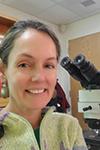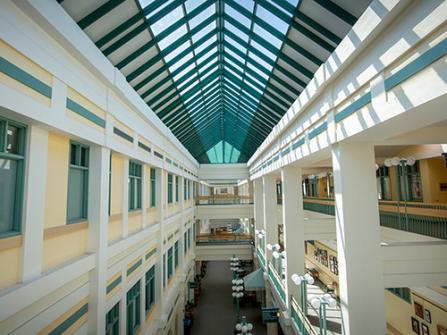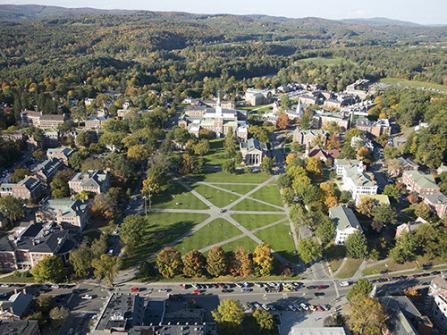“Welcome to the Dartmouth Hitchcock Medical Center Pathology residency program. I hope that you find the information you need on our website. We look forward to meeting you this interview season!”
Candice C. Black
Pathology Residency Program Director
Welcome to the Department of Pathology and Laboratory Medicine
Program information
The Pathology Residency Program at Dartmouth Hitchcock Medical Center is an Accreditation Council for Graduate Medical Education (ACGME)-accredited program. We have 14 residents in our combined anatomic pathology and clinical pathology (AP/CP) track. We are located in Lebanon, New Hampshire, on the Connecticut River.
The well-balanced curriculum prepares residents for practice in a variety of career paths, including academics, sub-specialty, and general pathology. The program teaches and reinforces key concepts in a carefully designed 4-year didactic program and core curriculum that prepare residents for boards throughout their residency. We include interactive sessions and self-assessment quizzes. The first-time take board pass rate is exceptional.
Department leadership has created a stable learning environment for our trainees. The integration of residents into the life of the department has grown resident education and patient safety. “Our mission is to guide and educate physicians in pathology and laboratory medicine, to contribute to and advance the specialties therein, and to nurture wellness through professional interactions, collegiality, and personal goals.”
We are fortunate to have a top-tier academic medical center in a beautiful, rural location. The Norris Cotton Cancer Care Pavilion Lebanon is our comprehensive cancer center as designated by the National Cancer Institute. Our residents are encouraged to attend and present at interdisciplinary tumor board meetings. Dartmouth Hitchcock Medical Center is affiliated with Geisel School of Medicine at Dartmouth and Dartmouth College, and residents have many teaching opportunities. There are many recreational opportunities year-round in this beautiful New England region. There are many destinations available whether you are looking for skiing in winter, fishing in summer, hiking any time of year, or just want to see the beauty that surrounds us here every day.
Our residents are successful in obtaining highly selective fellowships. In the last 5 years, our graduates have done fellowships at Boston Children’s Hospital, Mass General Hospital, University of Virginia School of Medicine, Northwestern University Feinberg School of Medicine, Miami Dade County Medical Examiner’s Office in Miami, Cook County Medical Examiners office in Chicago, Emory University, University of New Mexico and right here at Dartmouth Hitchcock Medical Center. To learn more, please visit Freida.org. Applications are accepted through the Electronic Residency Application Service (ERAS).
Pathology tour
Faculty
Rotation schedule
The residency program has a “core” curriculum that residents must complete to successfully graduate from the program. The schedule is broken down into 13, 4-week blocks per year. The core curriculum consists of 23 blocks of anatomic pathology training, 18.5 blocks of clinical pathology training, and 10.5 blocks of electives. The PGY-1 year is AP heavy with 2 blocks of AP basic training (orientation), 5 blocks of surgical pathology bench, 3 blocks of autopsy and neuropathology and rounded out with core blocks of the resident’s choice. The PGY-2 year is CP heavy with 1 block of CP basic training and 1 block each of transfusion medicine, hematopathology, chemical pathology, microbiology and rounded out with core blocks in AP or CP of the resident’s choice. PGY-3 and PGY-4 residents take the remaining core and elective rotations.
Working at Dartmouth Hitchcock Medical Center
We offer benefits, including stipends, insurance, and assistance programs.
See also important and required GME policies to read prior to your interview:
Educational funds
In addition to the educational funds provided by the GME Office, the Department of Pathology and Laboratory Medicine provides a 1 time $500 fund to each incoming resident. These funds are used to purchase core pathology textbooks such as Rosai and Ackerman’s Surgical Pathology and Sternberg’s Surgical Pathology from a list of approved texts. The Department of Pathology and Laboratory Medicine also provides up to $2,500 a year to support residents in their presentation of original scientific research at national meetings.
Conferences
The program’s weekly AP Conference follows a 4-year cycle and covers all fundamentals of subspecialized surgical pathology and cytology. The weekly CP Seminar series follows a 3-year cycle and covers Lab Leadership, Lab Director Duties, Accreditation, as well as the fundamentals of subspecialty CP. Weekly CP Call Rounds/Quiz/Chalk Talk Conference includes review and the prior week’s on-call, a CP quiz and a 10-minute screen-free “chalk talk” that the residents give on a focused CP topic. Puppetry, poetry and white board presentations have been given. We have weekly multihead scope sessions in Cytopathology, Surgical Pathology, Neuropathology, and daily “plate rounds” in Microbiology. In addition to these conferences we have weekly autopsy reviews, renal pathology, cytology didactics, grand rounds with guest lecturers, journal club, forensic pathology conferences and many more through the department and cancer center.
Research and program opportunities
Members of the Department of Pathology and Laboratory Medicine are actively involved in a variety of clinical and basic science research projects. The program has 2 resident scholarly activity leaders who meet with each resident during their first and second years of training to guide the residents’ research pursuits and connect them with faculty and resources. We strongly encourage residents to develop their own scholarly activity project. Many residents have published papers or abstracts and have made presentations of their work at national meetings. Residents may schedule elective blocks to pursue in-depth study and scholarly activity in subspecialty areas of interest.
Elective and lab directorship opportunities
Residents have 10.5 blocks of elective time during the 4-year program. These elective blocks are filled with rotations chosen by the resident in areas of personal interest. Residents may schedule elective blocks to pursue in-depth study or scholarly activity in areas of interest. Residents may return to a core rotation with increased responsibility, and act as a junior attending, such as our Elective in Advanced Surgical Pathology, that does not have grossing duties but includes departmental consultations.
Pathology residents may apply for 1 off-site elective block during their residency. The goal of the off-site elective is to enhance future career opportunities, and to provide an educational opportunity that is not available at Dartmouth Health or its members and is considered educationally significant for the resident's training.
The Focused Independent Study elective is designed to be used by a resident desiring to set aside time to study a topic or several related topics in the field of pathology in greater depth than usually possible while providing ongoing, routine service work responsibilities. With the advice and direction of a faculty member of the resident's choosing, a reading program of substantial depth and volume is developed. On the advice of the faculty, review of slide sets, virtual study sets, or other practical work is included to augment the resident's learning.
PGY-3 and PGY-4 residents may choose to participate in the Lab Directorship elective. This unique experience exposes the resident to lab directorship responsibilities at the 4 smaller, critical access hospital laboratory members in Northern New Hampshire. The goal of the rural rotation is to further prepare the resident for future laboratory leadership. The resident will be exposed to clinical consultations/test interpretation, delegation and annual evaluations, proficiency testing review, troubleshooting, corrective action and overview, analyzer/test validation, lab-wide quality control/quality assurance, procedure development and review, staff education and common on-call responsibilities. The Department of Pathology and Laboratory Medicine covers travel and housing costs. This rotation may be taken for up to 2 weeks total during residency.
Orientation
All Pathology residents are welcomed with 8-weeks of programmatic and anatomic pathology orientation. Program leadership reviews all program policies, curriculum, and technologies with the new residents, including the resident management system (MedHub), the patient electronic management systems (EPIC and Cerner), and voice-recognition software (Voicebrook). The residents receive didactic and slide seminars with faculty, reviewing basic anatomy and histology, common pathologies and patient care pearls in a sub-specialized systems approach. A book discussion on leadership and medical ethics, a seminar on “Goal Writing” for residency, and an introduction to the research process and our biomedical library resources are included.
The Pathologists’ Assistants demonstrate the fundamentals of handling tissues for routine and specialized procedures, frozen sections, and quality and patient safety issues relevant to the surgical bench. Residents have the opportunity to dissect and log specimens in all areas of subspecialty during orientation, with periodic observation of case sign-out with senior residents and faculty. Residents are introduced to the Autopsy service with multiple introductory didactics from our Autopsy Director demonstrating the importance of post-mortem examination, legal jurisdiction, the written report and death certificate, common organ pathologies, dissection techniques, and clinico-pathologic correlation of autopsy findings. Residents perform autopsies paired with senior residents or faculty.
In the first 4 weeks of the PGY-2 year we offer orientation for clinical pathology and laboratory medicine. This orientation introduces the residents to each clinical pathology subdiscipline and acquaints them with basic techniques used in the laboratory. This training prepares the residents for being outstanding lab managers. The residents are introduced to the government and specialty regulations for accreditation and will perform a mock inspection of the clinical lab. Residents will participate in a test utilization project, will learn the fundamental principles of “yellow-belt” quality improvement, and may begin a quality improvement project. Residents complete the College of American Pathologists (CAP) lab inspector training. Residents also receive training on performing bone marrow biopsies including hands-on training in the Patient Safety Training Center.
Match communication code of conduct
We follow the National Resident Matching Program (NRMP) guidelines for the match process. We will not contact you but are happy to hear from you and to answer questions you may have that are not answered during the application and interview process.
Contact us
Phone: 603-650-8623
joanne.m.dowling@hitchcock.org (Program Coordinator)
candice.c.black@hitchcock.org (Program Director)
Life in the Upper Valley
The Upper Connecticut River Valley area of central New Hampshire and Vermont includes the towns of Hanover and Lebanon, New Hampshire. Known as "The Upper Valley," this region attracts people from around the world for its scenic beauty.
The Upper Valley area offers a wide variety of cultural and recreational activities for people of all ages.
Welcome to Dartmouth Hitchcock Medical Center
We have everything that you would expect a major academic center to have, from inpatient wards, outpatient clinics, to a cardiac Cath lab. Dartmouth Hitchcock Medical Center is a beautiful institution and provides a welcoming collegial atmosphere.


